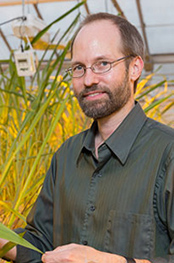|
|
|
|
ARS Geneticist Edward Buckler Receives First National Academy of Sciences Prize in Food and Agriculture Sciences
April 27, 2017
WASHINGTON D.C. April 27, 2017—Agricultural Research Service (ARS) geneticist Edward Buckler is the first person to receive the National Academy of Science's (NAS) Prize in Food and Agriculture Sciences. Buckler will be recognized for pioneering the use of large-scale genomic approaches linking genes with the crop's physical traits. This work is giving plant breeders' better access to key genes and reducing the time needed to improve critical traits that enhance food security.
Buckler, an NAS member, works at the ARS Plant, Soil and Nutrition Research Unit in Ithaca, New York. He began his large-scale genomics work by developing an encyclopedic amount of information relating the 40,000 genes and nearly 2.3 million base pairs in the maize genome to specific traits in the field. Then, to manage the mountain of data such work generates, he created software packages and algorithms that automate the screening and analysis of the genetic diversity. This makes it possible for even modest breeding programs to efficiently identify and select the parents most likely to produce offspring with new and improved traits.
"Dr. Buckler is an exemplary ARS scientist. He has continued to work at the forefront of scientific discovery and has made significant scientific contributions to the world," said ARS Administrator Dr. Chavonda Jacobs-Young. "I am proud that his work is done under the banner of the Agricultural Research Service."
Buckler and his collaborators have already developed non-genetically engineered maize varieties with 15 times the typical level of vitamin A—providing a solution to a common sight-threatening deficiency in the developing world. He and his group also have addressed other agricultural traits crucial to improving food security such as local adaptation, drought tolerance and disease resistance.
Accelerating such variety development is vital to food security in the United States and elsewhere.
A champion of open data and innovative partnerships, Buckler has developed software and other techniques for analyzing natural genomic diversity freely available. His software is downloaded more than 20,000 times a year and has been applied to more than 1,500 species. It has even affected the study of the human genome, mostly focused on the finding the genetic basis of human disease. The methods that he and his team have developed are applied to all areas of genetics including medicine, agriculture and conservation.
The NAS Prize in Food and Agriculture Sciences recognizes research by a mid-career scientist at a U.S. institution who has made an extraordinary contribution to agriculture. The prize is endowed through generous gifts from the Bill & Melinda Gates Foundation and the Foundation for Food and Agriculture Research.
For more information contact Kim Kaplan, ARS Office of Communications.
The Agricultural Research Service is the U.S. Department of Agriculture's chief scientific in-house research agency. Daily, ARS focuses on solutions to agricultural problems affecting America. Each dollar invested in agricultural research results in $17 of economic impact.


